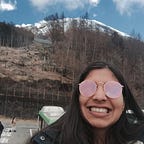As we become increasingly divorced from our biologies, it is important that we, especially we young adults, embark on our own personal journeys to “find ourselves.” This doesn’t entail a trip to some faraway location as much as it involves knowing our bodies and our minds.
In The Wisdom of Insecurity, in a chapter titled “The Wisdom of the Body” Alan Watts wrote in 1951 about the truest form of wisdom, that which we were never taught but that we innately know about ourselves: “how to breathe, swallow, circulate the blood, digest food…” As time went on, we see that even these simple functions are impaired: pollution leads to asthma, diabetes results in hypertension, etc. Watts continues that “we try to effect an adaptation to life by means of external gadgets…we have been taught to neglect, despise, and violate our bodies, and to put all faith in our brains.” As we continue to see the brain as separate from our bodies, we will continue to be unhealthy and unhappy.
In his newest book 21 Lessons for the 21st Century, Yuval Noah Harari explores a similar topic in the final chapter, titled “Meditation.” He writes that the most important thing someone’s ever told him was to be aware and present in the moment; when your focus diverges, maintain an awareness of your mind wandering. “If you want to understand death, you need to understand life,” he writes, going on to write that we don’t even have an awareness of what goes on in our bodies. Paying attention to what happens physically when we experience emotional highs and lows is important, he argues, and something very few of us even think of doing. The chapter goes on to describe the importance of knowing our relationship to our biologies, the physical processes of the Homo sapiens.
I’m certainly not the first to write about this topic—and I won’t be the last—but as a student who is in the process of discovering myself as an academic and intellectual, I haven’t put much thought into myself as a biological organism. The latter identity is the most important, as it holds the key to my health and happiness.
As a scientist, I quickly realized the best way to live my best life was through education, exploration, and experimentation. Seth Roberts wrote about his discoveries through self-experimentation, which I initially found a reference to from an Appendix of Tim Ferriss’s book The Four Hour Body. Especially with recent media trends on health, mindfulness, and “self-help,” it’s important to find methods that work for you and your lifestyle and stick with them, rather than buying a new product every week to see if it’ll be the one that solves all your problems. In my experience, getting rid of something (junk food, cosmetic products, caffeine) has been more productive than adding the use of some new item/food.
Many young people don’t take their health very seriously, until it’s too late. Many young people are also incredibly unhappy for a multitude of reasons. A lot of these can be attributed to the ways we’ve distanced ourselves from our biology.
